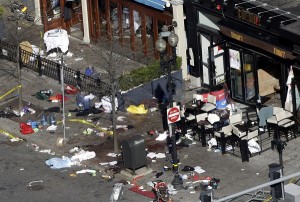Boston tragedy hurts unique bond of running community

One of the blast sites on Boylston Street near the finish line of the 2013 Boston Marathon is seen in Boston, Tuesday, April 16, 2013, one day after bomb blasts killed three and injured over 140 people. AP PHOTO/ELISE AMENDOLA
This is a tragedy that hurts not only city marathons, like Boston, New York and London, but the running community at large. There is a unique bond that forms during marathons not just with fellow runners but with the spectators and bystanders. From the high of hearing strangers cheer for you, to the sticky high fives from 6-year-olds and the promised kisses of Wellesley girls. It’s a moment that lasts a lifetime and keeps a tradition going stronger than ever even after 117 years.
The 117th Boston Marathon was not a day to be fast but lucky.
When we lined up to ride the buses to the Hopkington starting line at 6:30 a.m. that morning we had no idea what was in store for us later that afternoon.
Last year’s grueling race conditions due to record high temperatures pale in comparison to the impact of that afternoon’s double bomb explosions and the discovery of at least two more similar explosive devices in hotels near the race finish.
Post-race chaos
We had all successfully crossed the finish line and were already walking away, exchanging war stories about the race, when we heard the blasts.
When the blasts occurred we had no idea where the explosion came from except that it was so loud that it had to be close by. We were in the middle of Boston’s financial and commercial district, an area surrounded by several tall buildings with masses of spectators milling around. It was the usual post-race chaos of families and runners.
Armed with our post-race gear bags we were discussing what restaurant to go to to celebrate when we heard the two explosions within seconds of each other. Right away we knew something was wrong and ran to the nearest police officer. Before he could answer our questions, his walkie talkie went off and he hurriedly left his post guarding the entrance to the runners’ family reunion area and headed at a run in the direction of the blast.
Cell phones down
When we tried to use our cell phones, we found we could not send or receive texts. We were to discover later that this was a precautionary move from the local government to prevent more bombs from being detonated via mobile phones. Nearly 20 minutes later, when we regained access to the Internet, we found out that two bombs had exploded near the finish line two blocks from where we were standing when we first heard the blast, and that the organizers had officially stopped the race.
In minutes, we heard sirens and saw ambulances heading toward Boylston Street, the finish line. As we walked back to my sister’s apartment located a mile from the blast, we started to receive calls and text messages from family and friends—some of whom we hadn’t heard from in years—asking how we were.
We noted uniformed policemen standing on most street corners. All local off-duty police had been called in on emergency alert. FBI, official vehicles and ambulances with sirens blaring were evident all over the city. A lot of information we were receiving was from local TV, one of whose journalists had run the race and was actually inside the Lennox Hotel lobby, the hotel nearest to the bomb explosion site, when the blast occurred.
Empty streets
City officials advised everyone to avoid big public areas and to stay away from the city center where the bombs had exploded.
It seemed as if the busy streets of Boston had emptied and became a ghost town in a few short hours. We had dinner in a popular restaurant and it was strangely empty as well.
Free food, shelter
We later found that runners who had not crossed the finish line were escorted off the course to an alternative safe family meeting area, the original meeting area being located too close to the bomb site. The city and marathon organizers issued hotlines so families could find each other or find alternate accommodations, and a tip line to report any suspicious activities.
A local restaurant opened its doors to anyone needing shelter and food—payment only if able—as spectators and runners found themselves in a scene resembling post-apocalyptic dimensions.
Amidst the horror stories of lives and limbs lost, a 78-year-old runner who was thrown from the force of the blast but was otherwise unhurt, had recovered and vowed to run the Boston Marathon again.
The mayor of Boston has promised to leave no stone unturned in catching the perpetrators. US President Barack Obama has sent over government resources and asked the nation to pray for all the victims and their families.
Worst-case scenario
Yet all this will not erase the memory of this evil act and will no doubt affect the planning and security of all future “big city” marathons. In the worst-case scenario, this could spell the end of “big city” marathons and open spectator events in general.
(The author, formerly the publisher of the Sunday Inquirer Magazine, and her sister Amanda have raced Boston together for three years since 2010.
Leica’s finishing time (her 14th full marathon): 3:33. Amanda’s finishing time: 3:28.)














